ARTICLE AD BOX

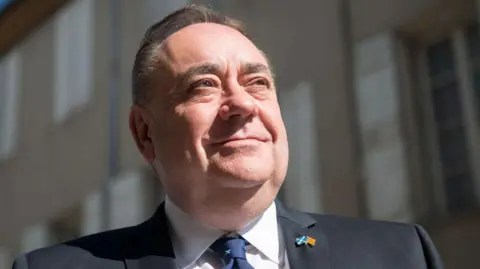 Getty Images
Getty Images
Edinburgh awoke on 19 September 2014 with a blanket of mist soaking the stones of the old city.
The cacophony of an independence referendum campaign which had echoed through Scotland for three years had died away and Alex Salmond, so often the embodiment of pugnacious self-confidence, appeared pale and drained.
Overnight it had become clear that the nation had voted decisively, although not overwhelmingly, to stay in the United Kingdom, retaining its 307-year-old union with England.
Soon, we squeezed into the drawing room of the first minister's official residence, Bute House, to watch Salmond announce his resignation as leader of the devolved government which he had run since 2007, and of the Scottish National Party, which he had dominated for far longer.
Salmond was clear that he accepted the democratic verdict of the people but while there was a hint of dejection in his manner, there was a flash of defiance in his words.
"For me, as leader, my time is nearly over but for Scotland the campaign continues, and the dream shall never die," he said.
Earlier he had delivered a similar message to his devastated supporters, telling them: "Let us not dwell on the distance we have fallen short. Let us dwell on the distance we have travelled."
It was indeed some distance.
Although Salmond joined the SNP at a time of relative success in the 1970s, the party and the independence movement were still shadows of what they would become under his leadership from 1990 to 2000 and, even more so, from 2004 to 2014.
Salmond modernised and professionalised the SNP, ensuring its machinery was overhauled and its message was polished until it glinted like granite in the sun.
He loved the cut and thrust of Westminster politics - as well as the intrigue - and he could wield words with the best of them.
Salmond's interviews, his speeches and his contributions in the House of Commons and the Scottish Parliament were strewn with shrewd and highly quotable little nuggets - politics boiled down to their essence.
Those nuggets would often be accompanied with a historical reference, a poetic flourish or both.
During the referendum campaign he took to quoting Fletcher of Saltoun, noting approvingly that the Scottish noble had spoken out against the 1707 union with England.
It sounded as if he were hoping that his name would soon appear in the same history books.

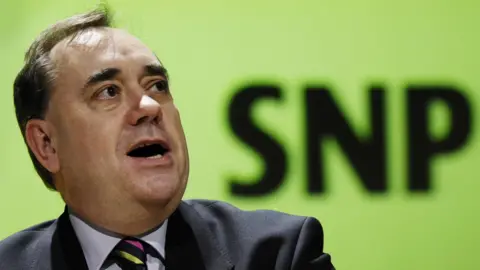 PA Media
PA Media
At the time that did not seem an entirely fanciful hope for the boy from Linlithgow who had grown into a master of the strategically savvy soundbite, and of turning defence into attack.
His stock response to tough questions about the economic challenges which might face an independent Scotland was to scoff that, "of course", independence would not lead to the installation of three taps in every home - one for oil, one for whisky and one for water.
It was pure deflection, skilfully deployed, inviting the listener to smile with him rather than to think about the question, while also somehow conveying the vague impression that maybe one's home could indeed have all three of those taps in an independent Scotland.
Some voters found this approach patronising, disingenuous or even smug. But many others delighted in his ability to stick it to pesky journalists, particularly the ones from "down south" who wore their support for the union on their sleeves.
As recently as last month Salmond was making mischief on BBC Radio 4's Any Questions? He noted that Labour, the SNP and the Conservatives were all blaming each other for the unpopular withdrawal of benefits for some pensioners, before pausing and, to laughter, delivering his punchline: "I agree with them all."
He could still be a thorn in the side of both unionist opponents and former nationalist allies.

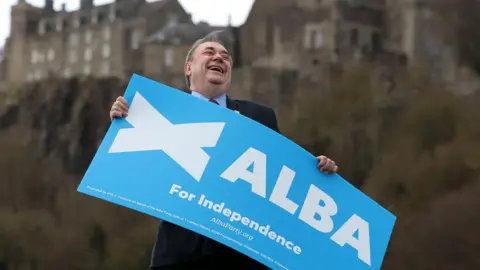 PA Media
PA Media
Salmond founded the Alba Party after leaving the SNP
Of course he was not always a strategic genius.
Under Salmond's leadership the pro-independence Alba Party had very little electoral success.
His judgment on international affairs could be questionable. In 1999, his dismissal of Nato's military action in Yugoslavia as "unpardonable folly" was widely criticised.
The then Foreign Secretary Robin Cook accused him of failing "to see the clear distinction between the resolve of a democracy defending itself against dictatorship, and a dictatorship engaged in ethnic cleansing."
More than two decades later, Salmond's protege and successor as First Minister, Nicola Sturgeon, declared herself "appalled" at his decision to host a chat show on the Kremlin-backed broadcaster, RT.
There were other flaws which some have chosen to ignore as inconvenient and others to dismiss as irrelevant.

 PA Media
PA Media
Salmond was acquitted after a trial at the High Court in Edinburgh in 2020
His trial on sexual assault charges revealed that his behaviour with women was sometimes inappropriate.
At the High Court in Edinburgh, he was acquitted by a jury of his peers. He goes to his grave without a criminal record.
But his admitted conduct in office - pouring alcoholic spirits for younger, female members of staff in the bedroom of the first minister's official residence late at night and, on at least one occasion, apologising for the manner in which he had touched them - was shocking.
His characterisation of one such encounter as a "sleepy cuddle" drew particular scorn from his critics.
Even his lawyer did not try to excuse his behaviour entirely, saying that Salmond "could certainly have been a better man".
He not only walked free from court but he also won a civil action against the Scottish government for its handling of complaints against him, and to the end he continued to insist that there were those in the SNP who had conspired against him. There may yet be further fallout from the whole affair.

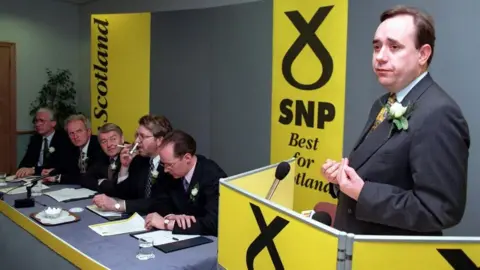 PA Media
PA Media
Salmond helped take independence from a fringe pursuit to the mainstream
Considering Alex Salmond's career in purely political terms, perhaps his most consequential call was to throw the SNP's weight behind the campaign for a Scottish Parliament as a stepping stone on the road to independence, siding with the so-called gradualists in his party rather than those known as fundamentalists who saw devolution as a diversion.
Whether or not this decision eventually leads to the realisation of Salmond’s dream will be for historians to judge.
For now, Scottish politics is in flux.
After 17 years in power at Holyrood, the SNP under John Swinney heads towards the 2026 Scottish Parliamentary election on the heels of a thumping by Labour in this year’s general election.
After the UK Supreme Court ruled that Westminster’s permission was required for any future referendum on independence to be held, there is no obvious mechanism for the SNP to advance its constitutional preference any time soon.
And Salmond leaves behind a deeply fractured movement - most vividly demonstrated by the total breakdown in his political partnership with Ms Sturgeon - and a party traumatised by its own internal battles, not least about his judgment and conduct.
And yet.
On the day he resigned as first minister he talked of "the energised activism of tens of thousands of people who I predict will refuse to meekly go back into the political shadows".
In the decade since the vote, that has proved prescient.
There is no immediate prospect of Scotland becoming independent but few would deny that Alex Salmond advanced the cause more than anyone else in modern Scottish history, taking it from a fringe pursuit to the mainstream aspiration of nearly half the electorate.

 6 months ago
23
6 months ago
23


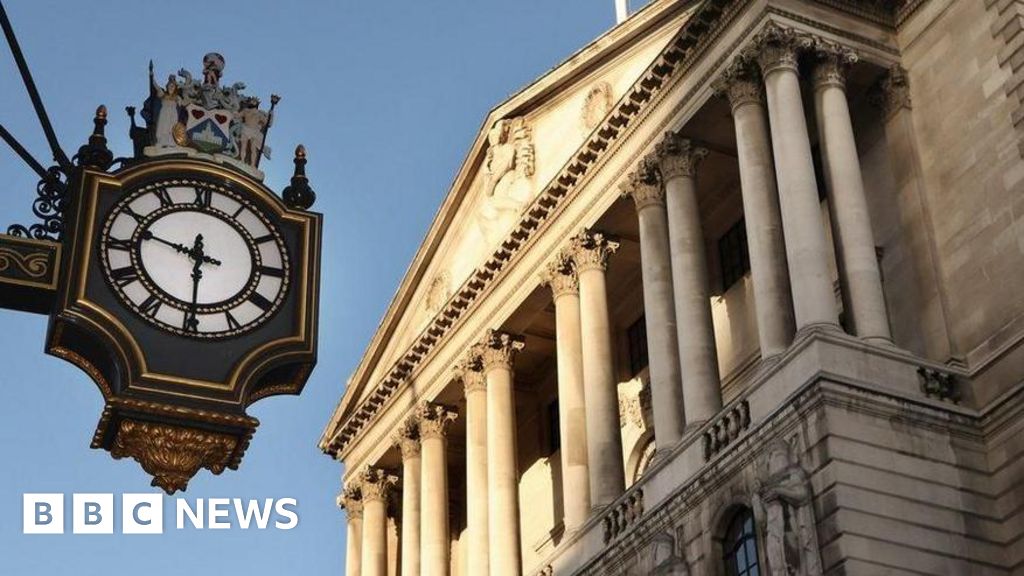





 English (US) ·
English (US) ·